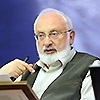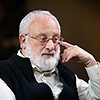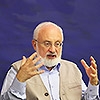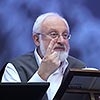Audio Version Of The Blog – 9/7/22
Listen to an Audio Version of the Blog
Download:MP3 Audio

Listen to an Audio Version of the Blog
Download:MP3 Audio
 From My Facebook Page Michael Laitman 9/7/22
From My Facebook Page Michael Laitman 9/7/22
Ken Burns is regarded by many as one of the foremost documentarians of American history, with iconic works such as “The Civil War,” “Jazz,” and “Baseball.” Recently, he completed a project that began in 2015, initiated by the U.S. Holocaust Memorial Museum, about America during the Holocaust. The result of the project is a PBS six-hour documentary divided into episodes. The series, titled The U.S. and the Holocaust, examines how Americans treated Jews and immigrants during World War II, and reaches daunting conclusions.
JTA interviewed Burns and his team about the project, which “chronicles the xenophobic and antisemitic climate in America in the years leading up to the Nazi genocide of Europe’s Jews: a nation largely hostile to any kind of refugee, particularly Jewish ones, and reluctant to intervene in a war on their behalf.”
The series exposes not only America’s indifference to the fate of the Jews in Europe, but also the reluctance of many American Jews to help their European coreligionists. According to Lynne Novick, a Jewish member of Burns’ team, these Jews didn’t want to let any more Jews in, at least in part because they looked down on the Eastern European refugees as poor and unassimilated. “It took me a while to really get my mind around the idea that there was a significant voice within a powerful Jewish American community that [believed] we shouldn’t say too much because it will just stir the pot and awaken more antisemitism,” Novick said.
In an interview for CBS about the series, Burns said that seeing how antisemitism is increasing in America today, he is afraid that what happened in Germany might happen in some form or other in the US, as well. At the end of the interview, he implores the American people: “There is, right now, all of the elements coalescing for something bad to happen again. Let’s not get there again, as human beings, please, let’s not get there again.”
Films such as The U.S. and the Holocaust are helpful in that they offer a glimpse into what might happen today. The way the new cataclysm unfolds will certainly be different from the past, but its purpose will be the same as the old one: to cleanse the Earth of Jews. Regrettably, I think we are only a few years away from it.
Yet, the glimpse into the past will also have a negative side to it: Instead of deterring us from repeating the horrors of the past, it will legitimize it in the eyes of many people. Once people see that America has been antisemitic for generations, it will lift the veil of shame and they will not be embarrassed to show their real feelings toward Jews.
To me, the most important lesson from the series is the fact that Jews denied other Jews an escape from persecution. Worse yet, even when the world learned the truth about what was happening in Europe, American Jewry still made no serious attempt to influence decision makers to assist the Jews. In this attitude of division lies the seeds of the next catastrophe.
Jews have never been defeated when they were united. Every tragedy that has ever befallen our people had always been preceded by a period of division, internal bickering, slander, and often violent infighting. In different cloaks, Jewish internal hatred has been a precursor of every woe, from the Babylonian exile through the destruction of the Second Temple, the expulsion from Spain, the Holocaust, and virtually every slaughter and expulsion in between. Jewish division weakens us, emboldens and strengthens our enemies, flares up their hatred, and galvanizes them into action against the Jews.
Today’s American Jewry shows the exact same symptoms of division that have always preceded our past calamities. Therefore, I have no doubt that unless the Jews unite, another heartbreak is on its way.
We can still avoid it. If we unite, we will prevent it.
By we, I am not referring to American Jewry in particular, but to the Jewish people as a whole. If Jews unite anywhere in the world, it improves the state of Jews around the world. We are responsible for each other, as our sages have told us eons ago. Our mutual responsibility has never been broken; we simply do not use it to our benefit, and therefore suffer.
In the few years we have left before the arrival of another tidal wave of Jew-hatred, we can reverse the ominous course. But for this, we must agree to keep our brethren in our hearts, to agree to unite despite our disputes, to accept that we are one nation under God, one, united Jewish nation.
For more information on the connection between division among Jews and a rise in antisemitism read The Jewish Choice: Unity or Anti-Semitism: Historical facts on anti-Semitism as a reflection of Jewish social discord.

Photo Caption: Filmmaker Ken Burns speaks at the gala ceremony for the inaugural Library of Congress Lavine/Ken Burns Prize for Film, October 17, 2019. Photo by Shawn Miller/Library of Congress.
 For this reason, I will make an effort to give every word its spiritual identity, detached of space, time and change.
For this reason, I will make an effort to give every word its spiritual identity, detached of space, time and change.
It is upon the readers to memorize the meaning of these words thoroughly, for it is impossible to repeat them every time (Baal HaSulam, The Study of the Ten Sefirot, Chapter 1, Part 1, Restriction and Line).
Comment: Baal HaSulam also wrote a dictionary of definitions of Kabbalistic terms. He recommended that we memorize them so they do not need to be repeated every time.
My Response: The fact is that we cannot take any wise, pure person, no matter by what selection criteria we use, and explain to him or her what the upper world, the world of infinity, light, and being filled with light are. It is impossible. A person must come to such explanations on their own in the process of long-term work on oneself.
Therefore, Kabbalistic books seem so incomprehensible in the beginning that there is nothing to grasp onto.
But as a result of reading them, a person who studies Kabbalah begins to be influenced by the upper light, which is located in the created place (practically, this is a desire). Under the influence of this light, he gradually begins to feel what all this is about.
Thus, gradually he approaches the state when he can, in general, begin to imagine and quite correctly what this place is, what the filling of the place with the upper light is, which the great Kabbalist Ari really wants to tell us about.
[301957]
From KabTV’s “The Study of the Ten Sefirot (TES)” 8/14/22
Related Material:
The Need To Learn Kabbalistic Terms
Defining The Terms Is Key To The Study Of Kabbalah
Concepts for Describing the Upper Roots
 Question: What are the types of Klipot? As far as I know, there is an Egyptian Klipa, which your teacher Rabash calls general, and there is the Klipa called Amalek.
Question: What are the types of Klipot? As far as I know, there is an Egyptian Klipa, which your teacher Rabash calls general, and there is the Klipa called Amalek.
Answer: Yes, Amalek is an abbreviation of “Al Menat Lekabel“, which in Hebrew means in order to receive. It is the Klipa called Amalek that is aimed at leading a person away from the greatness of the Creator.
The Egyptian Klipa is called general because it conceals the true universe from all of us, while Amalek is a more private, internal Klipa, which closes even more the very core of the upper knowledge.
[302177]
From KabTV’s “Spiritual States” 8/21/22
Related Material:
Klipot (Shells) – Harmful and Helpful (Advanced)
What Is A Klipa?
The Difference Between The Ego And The Klipa (Advanced)
 Comment: A gift is a manifestation of love. In any case, whatever the gift is, it is the love and not the object itself that we give.
Comment: A gift is a manifestation of love. In any case, whatever the gift is, it is the love and not the object itself that we give.
My Response: Yes, of course.
Question: How can you give love without an object?
Answer: By a thought, by an intention. How else? To do this, you have to be in contact with a person. There is no difference whether it is corporeal or mental; the main thing is that there is contact. Then the person feels your attitude toward him.
Question: You even gave an example of how a child brings his mother his doll and gives it to her. Is this also a manifestation of love?
Answer: Yes, of course. He pulls out a doll and offers it to you because he feels how important it is for him, and thus expresses his attitude toward you.
Comment: I know that you do not particularly like some material gifts that clutter up the place, but you accept them in order to please a person.
My Response: How can I refuse it if a person brings it to me? But if you really want to give me a gift, then the biggest gift for me is to succeed in disseminating Kabbalah, to be my assistant in this.
Question: Did you give gifts to your teacher Rabash?
Answer: What could I give him?! Nothing. In what way could I express my affection, my dependence, my goodwill? Only in such an action.
You can make a person happy only when you do what he wants. What does he want? If the entire life of a Kabbalist is to bring correction into the world, then you must help him in this.
[302240]
From KabTV’s “I Got a Call. Gift for a Kabbalist” 3/18/13
Related Material:
The Gifts Of Abraham
Demonstration Of Love
Truth Is Love
 In the News (Stanford Business): “A Global Look at the Connections Between Happiness, Income, and Meaning”
In the News (Stanford Business): “A Global Look at the Connections Between Happiness, Income, and Meaning”
“Wealthy people may be happier. But a new study finds that money can’t buy a sense of purpose.
“‘Humans think happiness is this one thing: You’re either happy or you’re not,’ Jennifer Aaker says. Of course, it’s not so simple: New research conducted by Aaker and her colleagues not only challenges the assumption that happiness is binary but also finds that the relationship between happiness and our sense of meaning can change depending on our financial situation.
“‘This is particularly interesting because research has shown when people get wealthier, they experience greater happiness,’ explains Aaker, a marketing professor at Stanford Graduate School of Business who has extensively studied happiness, meaning, and money. ‘But this research suggests that the nature of happiness also shifts based on income.’
“In a forthcoming study…, Aaker and her coauthors find that meaning is a stronger predictor of happiness for people with low incomes than those with greater financial resources. In other words, people with more money may be happier, but people with less money view happiness as tied to a sense of meaning — the belief that their life has purpose, value, and direction.”
Comment: Money appears to buy a person and extinguish the search for the meaning of life.
My Response: It clogs him.
Question: So we quite possibly will fall for money despite the fact that we have found a high meaning of life?
Answer: Money starts to twist you: Do this, do that, and just like that you’re gone.
Comment: Explain to us the system, the mechanism of this. I have found the meaning of life and I am happy that I have found meaning in life. Then abruptly such a force appears, which is called money, business, politics, and suddenly…
My Response: It’s the ability to create with the help of politics, money, power, or whatever. And you start participating in it and it swallows you up. Nothing can be done.
Question: Even in our case, there are a lot of questions here. Guys come and they seem to be completely immersed, but politics or business suddenly appear and it takes them away. We saw them burning with desire for the goal, but alas!
Why is this done from above? After all, the Creator directed humans to search for the meaning of life, and then found the meaning of life. Why is the Creator taking a person away?
Answer: He takes them away in order for a person to realize, once again by going through one’s desires, sufferings, goals, and opportunities to once again make a choice.
Question: Which means, a person has to make a round once again and it is unknown whether he or she will return in this life or in another one? Is this done intentionally by the Creator?
Answer: Of course, yes. Well, what will you do? It will be better next time.
Question: And what is cleaned up at the same time? What does this person have to clean up during this period?
Answer: The determination to find meaning and not sell this meaning for dollars, for a position, or for something like that.
Question: A person can be retained by saying, “Well, what are you doing?! Is it possible to change the meaning of life for this?!”
Answer: It depends on his current condition. But in fact, no, not seriously.
Question: Even based on your experience, do you think something could buy you when you came to your teacher hot and burning?
Answer: Nothing.
Question: Is this determined by all the previous sufferings that you went through?
Answer: This is the point in the heart that requires only one thing—the meaning of life. And it can’t accept the meaning as being in some government structure, in wealth, in a house in Hawaii or something else.
None of it is a draw. But this is because a person is created this way and not because he is so great, big, or special. So it’s just luck.
Comment: Your answer regarding an opportunity to create was unexpected. So with money, business, a person has a thought: “Now I will create.”
My Response: Yes, this is about creativity! But of course! If I can travel the world, buy, and sell. I’m not interested in wealth; I’m interested in the process.
Question: And what about politicians?
Answer: The politician even more so.
Question: Let’s say that in our case you see to a smaller extent that you can really create? Or not?
Answer: In our case, everything is combined together because we are spreading the method of correcting the world. And it turns out that without this, the world will definitely not be able to see where it will roll. So we are preparing a methodology for the proper development for it.
Question: So this should be approached as a real and high form of creativity?
Answer: Yes, real and the highest creativity when you are just preparing a methodology for the world.
[301995]
From KabTV’s “News with Dr. Michael Laitman” 7/7/22
Related Material:
There Is Money But There Is No Happiness
Money Cannot Buy Happiness
How Does One Sell Happiness?
 Question: You often emphasize that dissemination is more important to us than to the world since we build ourselves through it. Yet sometimes it is the other way around and you say that it is more important for the world. What is dissemination for?
Question: You often emphasize that dissemination is more important to us than to the world since we build ourselves through it. Yet sometimes it is the other way around and you say that it is more important for the world. What is dissemination for?
Answer: Since all of us, all of humanity, are interconnected by invisible threads and tied into one single system, we need to disseminate. This system exists initially, does not disappear anywhere, and does not change; it only requires our greater active participation now.
Therefore we tell people that we must nourish this system and take an active part in it. That is, we must engage in internal and external connection with each other so that the external helps the internal one. This is mainly internal connection, but we need the external one to bolster us and to create the prerequisites for the more internal connection. This is how we go from simple to complex, from external to internal.
The whole method of dissemination and our work on ourselves lies in this. There is nothing else. The wisdom of Kabbalah tells us about the system in which we are connected together, how this system works, and how we gradually reveal this connection between us.
When we enter into the work of this system and begin to open and feel it, we suddenly see how our world dissolves. In fact, it does not exist; there is only this system of connection. No more computers with modems, no telephones; there is a direct connection between us, and everything else has melted away like morning fog.
Question: Does it mean that we don’t need dissemination just to keep a person busy so that he does not fool around?
Answer: No, nature forces us to it, and we must move to the new degree. This is the next degree of all that is. Our nature will disappear. Anyway, as many physicists and psychologists write today, it exists within us, in our sensory organs. Now our sensory organs will go through the stages of a certain development and rise to the next level where they begin to feel exactly this universe, this matrix.
Dissemination is the most necessary work that helps us to unite. Caring for others unites us.
[302198]
From KabTV’s “I Got a Call. Caring for Others Unites Us” 3/13/13
Related Material:
Dissemination Promotes Unification
Dissemination Is Spiritual Work
About the Benefits Disseminating the Science of Kabbalah
 Question: When you are asked a question, you answer according to the following principle: first you answer once, and, inside the same answer, a second time. Why is the answer arranged like that?
Question: When you are asked a question, you answer according to the following principle: first you answer once, and, inside the same answer, a second time. Why is the answer arranged like that?
Answer: Because first I have to answer the question itself, and the second time I have to answer in general where this phenomenon comes from, why it exists, in what form it takes place, and so on. That is, I don’t just want to answer the question, I want to give a general form of what kind of natural phenomenon it is.
Question: So you are not doing this because the person did not hear the first time and he needs you to explain the second time?
Answer: No. I don’t refer the question to a person at all. I look at the question as an opportunity to reveal some greater part of the spiritual world or the connections of the worlds.
Comment: It happens that you are asked a question and you answer as if you are on your own wave. The student says, “No, I meant this!” and still you keep going on your wave, and the others think: “Oh! You answered his question!”
My Response: I’m actually answering his question; he just doesn’t hear it. I’m not going somewhere to the side, but I just want him to see it from my side. Otherwise he won’t understand the answer.
Question: So you need to find a workaround, not a direct one?
Answer: This is not a workaround. I believe that my path is the most direct and general. I give both a linear path to the answer and a circular one, which generally includes the whole general problem and its specific solution.
Therefore I have two approaches: I always outline the general state and a specific answer.
[301913]
From KabTV’s “I Got a Call. How to Ask a Kabbalist a Question?” 3/6/13
Related Material:
“To Live, Or Not To Live, That Is The Question” (Linkedin)
A Crucial Question
Our Culture Is An Escape From The Question Of Life’s Meaning
Preparation to the Lesson
| [media 1] | [media 2] |
Lesson on the Topic, “Speaking with the Creator”
| [media 3] | [media 4] |
Lesson on the Topic, “Connecting the World in the Last Generation”
| [media 5] | [media 6] |
Writings of Baal HaSulam, “Study of the Ten Sefirot,” Vol. 1, Part 4, Chapter 2, “Inner Observation,” Item 9
| [media 7] | [media 8] |
Selected Highlights
| [media 9] | [media 10] |
 Michael Laitman, On Quora: “How do we know what is true and what is false?“
Michael Laitman, On Quora: “How do we know what is true and what is false?“
We cannot know what is true and false. The only one who knows what is true and false is the upper force. In the wisdom of Kabbalah, “nature” (“HaTeva”) is the same as “God” (“Elohim”). It is the upper force of nature. If we reveal this upper force, then we will know what is true and false, and right and wrong.
In other words, we need to define true and false according to the Creator’s (or nature’s) view. I understand the difficulty in accepting or understanding this, because today anyone can define God any way that they want, and can set out to even kill people in the name of what they define as God. Moreover, since everyone has their own God, the world is falling apart and this destruction will take place until we understand that we have no choice but to draw a common conclusion that there is just one Creator, one God, which is nature.
According to nature, connection above all differences and resistances is of utmost importance; that we need to come closer together above the various disturbances. Nature gave us this option in order for us to discover its wholeness and perfection. If we set out in such a direction, then we will find ourselves reaching a harmonious and peaceful world, and our definitions of truth and falseness would work themselves out along the way.
Based on the video “How to Know What Is True and False” with Kabbalist Dr. Michael Laitman and Oren Levi. Written/edited by students of Kabbalist Dr. Michael Laitman.